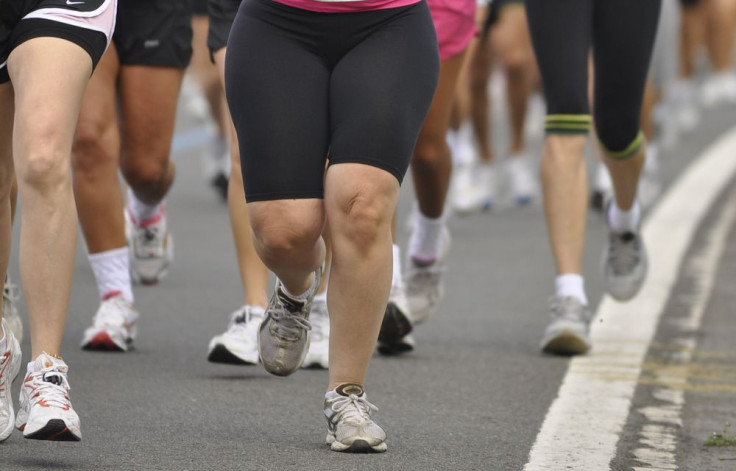Obese Marathon Runner Ignores Doctor's Warning, Inspires Plus-Sized People To Pick Up The Activity

When you hear someone described as a “runner,” perhaps the typical person will imagine a lean, fit, and able-bodied person with defined muscle tone. UK-based Julie Creffield doesn’t fit that mold, and as a clinically obese 36-year-old woman, she has even broken it by running in the 2012 London marathon, a feat only one percent of all athletes complete, proving she isn’t too fat to run.
“Despite my size 18 frame I am a runner,” Creffield wrote in her editorial on The Huffington Post. “I have in fact been a runner for the last 10 years running everything from 5k fun runs to full marathons. I run because I love the feeling of running, I love the community of runners where I have made many friends, but I admit I also run to keep control of my weight, and to help me lead a healthier and happier life.”
Creffield experienced the ups and downs of weight loss and admits she had obsessed about her weight in the past. After pulling a muscle in her back three weeks before running a marathon, she visited her doctor and was rudely awakened to his medical advice warning her not to run because she was “too unfit.”
Creffield did wind up running that marathon three weeks later. However, she said her doctor’s comments have left a sour taste in her mouth. She was so inspired by her own experience she launched “Too Fat To Run,” a website dedicated to inspiring other plus-sized women to run. She began writing a blog to chart her own experiences training to run in a marathon and gained a readership of about 200,000 from around the world.
Obese persons are at risk for a long list of life-threatening health conditions, including cardiovascular disease, stroke, type 2 diabetes, and various cancers, according to the Centers for Disease Control and Prevention. It is recommended obese people talk to their doctor before they start using running to get fit in order to perform a complete physical, check for blood pressure, heart rate, and cholesterol levels.
It’s all about prepping the body for running, so setting six- to eight-week goals will help ease the joints, muscles, tendons, ligaments, and lung capacity into shape along with a healthy diet of lean meats, low fats, whole grains, and plenty of fruits, vegetables, and of course, water. If not, obese runners will be at risk for heart attack, stroke, in addition to joint and muscle issues incurred from the strain of the extra weight.
"Two thirds of the UK population are overweight or obese and the media takes great pleasure in scare-mongering us into doing something about it with magazines promoting the next big faddy diet and government agencies telling everyone to ditch the car and cycle to work," Creffield told the Newham Recorder.
She believes doctors have to stop telling overweight or obese patients they should try swimming or walking and to be afraid of running in case they become injured.
"What we need are practical solutions where women feel empowered to be more active and where exercise is seen as something enjoyable and fun rather than a chore and something we must do," Creffield said.
Creffield’s website also sells clothing with the “Too Fat To Run” slogan and sizes that go up to 18. She plans to raise enough money through her site to start a clothing line of running apparel for plus-sized women.



























